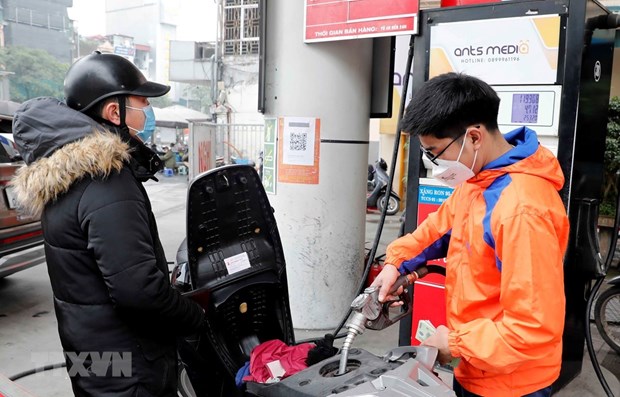Inflationary pressure threatens Vietnamese economic resilience
The Russia-Ukraine conflict and an increase in energy prices have affected economic growth and inflation globally as well as in Vietnam.
 The retail prices of petrol have been adjusted many times since the beginning of this year. (Photo: Vietnam Plus)
The retail prices of petrol have been adjusted many times since the beginning of this year. (Photo: Vietnam Plus)According to the Ministry of Finance (MoF), most international organisations believe that oil prices will hit 110-130 USD a barrel, even rising above 150 USD a barrel in the near future. Meanwhile, domestic petroleum products are currently under great pressure in terms of supply and world market developments.
A recent report by HSBC has shown that energy shortage and high oil prices will have a clear impact on Vietnam's trade. Specifically, the country’s imports of crude oil and petroleum in February were double the 2021 monthly average and this trend may continue in the coming time.
Nguyen Xuan Dinh, Deputy Head of the General Policy Division, Department of Price Management under the Ministry of Finance, said that the conflict between Russia and Ukraine is very unpredictable. The price of petroleum products as well as other materials increased sharply, resulting in the fact that the world now faces inflation pressure. Currently, the average inflation of European countries in the first two months of the year has surpassed 5% and Vietnam, too, is likely to suffer the impacts of inflation.
According to Dinh, as the Vietnamese economy’s openness is comparatively high, it will be indirectly affected by the import of goods and input materials. This will have a big influence on the cost of domestically produced products.
Nguyen Bich Lam, former Director General of the General Statistics Office (GSO) calculated that a 10% increase in petrol prices will have an impact on overall inflation by 0.36%. In fact, the average consumer price index (CPI) in the first two months of the year increased by 1.68%, of which oil and petrol prices surged by 45% since January. In the first two weeks of March, petrol prices rose by 60% compared to the beginning of the year, reflecting that the pressure on inflation is very high.
The MoF predicts that the CPI in March is likely to remain high due to the main impact of rising petrol prices. However, the ministry believes that the ability to control inflation is still within the price management scenario set out at the beginning of the year and the average 3-month CPI is expected to be between 2% and 2.1%. According to the calculation of the MoT, assuming CPI in the remaining months of the year increases steadily, it is possible to keep inflation at around 4% as planned.
Proactively response
To deal with rising prices that threaten the economy's resilience, Deputy Finance Minister Nguyen Duc Chi said that the ministry has coordinated with relevant ministries and agencies to prepare all scenarios to submit to the Government relating to regulating prices.
In case there is a sharp fluctuation in petrol prices, the MoF will adopt specific solutions to control inflation and ensure that they do not have a major impact on people's lives, production and business activities.
The ministry also has plans for other essential goods to keep the general price stable, he said.
To be proactive in price control from now until the end of this year is important, the MoF suggested ministries, agencies and localities coordinate in implementing a number of solutions.
Specifically, the State Bank of Vietnam was asked to carry out proactive and flexible monetary policy along with fiscal policy and macroeconomic policies to control inflation, thereby contributing to removing difficulties for production, business, and people's life.
Ministries and agencies were required to closely monitor developments in the world economy, general inflation, and price movements of essential commodities in order to promptly propose measures to ensure the balance of supply and demand and stabilise market prices.
The MoF asked people’s committees of centrally-run cities and provinces to perform the State management of commodities in line with their competence, and at the same time strengthen the inspection and supervision of the publicity of information on prices./.













